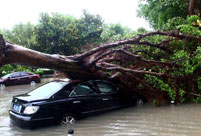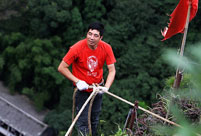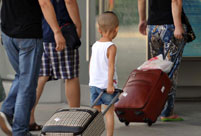BANDAR SERI BEGAWAN, Oct. 10 -- The 8th East Asia Summit (EAS) opened here Thursday to focus on food and energy security and cooperation in maintaining global peace.
The forum drew together leaders of the Association of Southeast Asian Nations (ASEAN) as well the bloc's eight dialogue partners including China, Japan, South Korea, India, Australia, New Zealand, Russia and the United States.
U.S. President Barack Obama and Russian President Vladimir Putin opted out of the summit and were represented by their respective foreign ministers. The United States and Russia were admitted to the regional forum in 2011.
In his opening address, Brunei's Sultan Hassanal Bolkiah highlighted that the focuses of the summit are food and energy security, climate change, disaster management and pandemic diseases.
He was "encouraged" by the moderate stance taken by Iran on its nuclear weapons program and noted that ASEAN was looking forward to more positive engagement.
"We also congratulate President Obama for attempting to move forward with issues in the Middle East. We are also pleased with the progress that has taken place between ASEAN and China on the South China Sea issue," he noted.
He said that meetings between ASEAN and China would continue next year to develop the Code of Conduct on the South China Sea.
He also thanked the leaders of Singapore and Thailand for supporting ASEAN to make progress on this issue.
U.S. Secretary of State John Kerry reaffirmed the importance of U.S.-ASEAN ties as a crucial element of the United States' strategic rebalance to the Asia-Pacific region.
Indian Prime Minister Manmohan Singh noted it is the foremost forum for promoting peace, stability and prosperity in the dynamic Asia-Pacific region.
"Given our vital stakes in the region, India has been closely involved in the evolution of an open, balanced and inclusive regional architecture, on the basis of the centrality of the ASEAN, " he said in a statement released ahead of the summit.
"India sees the East Asia Summit as a springboard to regional cooperation and integration and is participating in the negotiations for a Regional Comprehensive Economic Partnership among the ASEAN and its FTA partners, which will help create an economic community in the region," he added.
Other leaders including premiers of Australia and New Zealand put their focus on security and economic challenges.
A Chairman's Statement was adopted as the outcome of the summit, along with a Declaration of the 8th EAS on Food Security.
Since its inception in 2005, the EAS has served as a forum for dialogue on broad strategic issues of relevance to East Asia as well as other regional and global issues, with the focus on areas such as energy, infectious diseases, sustainable development, poverty reduction and environment.
ASEAN groups Brunei, Cambodia, Indonesia, Laos, Malaysia, Myanmar, the Philippines, Singapore, Thailand and Vietnam.
 2013 Colour Me Rad 5K run held in Canada
2013 Colour Me Rad 5K run held in Canada China's destroyer Qingdao sails out of Sydney Harbor
China's destroyer Qingdao sails out of Sydney Harbor Chinese tycoon aims to restore London's Crystal Palace
Chinese tycoon aims to restore London's Crystal Palace Typhoon Fitow affects 4.56 million people in east China
Typhoon Fitow affects 4.56 million people in east China Game for the brave: 'Spiders' in Yandang Mountains
Game for the brave: 'Spiders' in Yandang Mountains Travel peak witnessed on last day of National Day holiday
Travel peak witnessed on last day of National Day holiday  New couples take wedding photos during holiday
New couples take wedding photos during holiday Serena Williams stumbles through to quarterfinals
Serena Williams stumbles through to quarterfinals Thailand Mobile Expo 2013 kicks off
Thailand Mobile Expo 2013 kicks off Photo collection of Chinese Navy
Photo collection of Chinese Navy Dense haze envelops N China
Dense haze envelops N China Twins Culture Festival kicks off in Beijing
Twins Culture Festival kicks off in Beijing UNESCO world heritage site: Montale Tower
UNESCO world heritage site: Montale Tower Israeli drone crashes into Mediterranean, fragments recovered
Israeli drone crashes into Mediterranean, fragments recovered Serena Williams wins second China Open title
Serena Williams wins second China Open titleDay|Week|Month